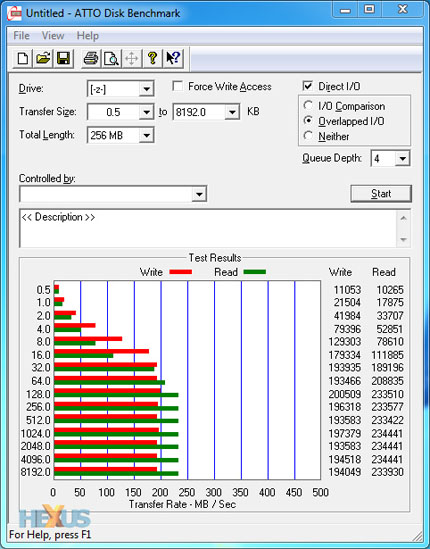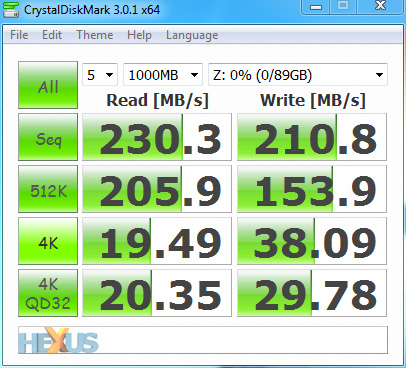SSD comparisons - part one
We've established that Kingston's 96GB SSDNow V+100 drive makes for an excellent notebook upgrade, but how does it stack up to other SSDs?
To find out, we've restored the drive to its factory state, plugged it into our Intel Sandy Bridge desktop and subjected it to our tried-and-trusted benchmark suite. The drive's results are compared to over a dozen other SSDs that encompass the SATA 3Gbps, SATA 6Gbps and PCIe interfaces.
Just before we get to the numbers, here's a brief rundown of our test system, benchmarks and comparison drives:
Desktop Test bench |
|||||||||
|---|---|---|---|---|---|---|---|---|---|
| CPU | Intel Core i5 2500K (3.3GHz, 6MB L3 cache, quad-core, LGA1155) | ||||||||
| Motherboard | Intel DP67BG | ||||||||
| Memory | 8GB Corsair Vengeance (9-9-9-24-2T @ 1,600MHz) | ||||||||
| Host hard drive | Crucial 256GB RealSSD C300 (SATA 6Gbps) | ||||||||
| Storage controllers | Intel P67 PCH (SATA 6Gbps, AHCI) | ||||||||
| Graphics card | AMD Radeon HD 6850 1GB | ||||||||
| Power supply | Corsair AX750 | ||||||||
| Operating system | Windows 7 Ultimate SP1, 64-bit | ||||||||
Desktop Benchmarks |
|
|---|---|
| ATTO Disk Benchmark | The freeware ATTO benchmark provides basic sequential speed results for both read and write operations. Using the default queue depth of four, we record read and write speeds during 1MB transfers. |
| CrystalDiskMark | CrystalDiskMark provides various storage benchmarks, but we're interested in the returned 32-thread 4K performance numbers to see how well the drives fare when tasked with numerous small transfers. |
| Iometer | Iometer is an I/O subsystem measurement tool originally developed by Intel. To measure a drive's I/O performance, we set the benchmark to utilise 4KB transfers in a random spread. Read and write distribution is set to 50 per cent, and queue depth at 32. The test is run for two minutes and we record the total I/Os per second. |
| PCMark Vantage | Emulating real-world use, PCMark Vantage spits out a bunch of data on the relative speed of the drives when undertaking common tasks. We record Windows startup, application load time and gaming performance. |
Comparison Drives |
||||||||
|---|---|---|---|---|---|---|---|---|
| Capacity | Controller | Firmware | Interface | RAID mode | TRIM support | Cost* | Cost per GB | |
| G.Skill Phoenix Pro | 40GB | SandForce SF-1222 | 2.1 | SATA 3Gbps | - | Yes | £80** | £2.0 |
| Crucial Real SSD C300 | 64GB | Marvell 88SS9174-BJP2 | 002 | SATA 3Gbps | - | Yes | £90 | £1.4 |
| Crucial Real SSD C300 | 64GB | Marvell 88SS9174-BJP2 | 002 | SATA 6Gbps | - | Yes | £90 | £1.4 |
| Corsair Force Series F80 | 80GB | SandForce SF-1222 | 1.1 | SATA 3Gbps | - | Yes | £145** | £1.8 |
| Kingston SSDNow V+100 | 96GB | Toshiba T6UG1XBG | CJR10202 | SATA 3Gbps | - | Yes | £105 | £1.1 |
| OCZ Vertex 2 | 120GB | SandForce SF-1222 | 1.11 | SATA 3Gbps | - | Yes | £160 | £1.3 |
| Intel 510 Series | 120GB | Marvell 88SS9174-BKK2 | PPG2 | SATA 3Gbps | - | Yes | £220 | £1.8 |
| Intel 510 Series | 120GB | Marvell 88SS9174-BKK2 | PPG2 | SATA 6Gbps | - | Yes | £220 | £1.8 |
| OCZ RevoDrive | 120GB | SandForce SF-1222 (x2) | 1.20 | PCIe x4 | RAID 0 (internal) | No | £250 | £2.1 |
| Intel X25-M | 160GB | Intel PC29AS21BA0 | 2CV102M3 | SATA 3Gbps | - | Yes | £295 | £1.8 |
| OCZ Vertex 3 | 240GB | SandForce SF-2281 | 1.11 | SATA 3Gbps | - | Yes | £425 | £1.8 |
| OCZ Vertex 3 | 240GB | SandForce SF-2281 | 1.11 | SATA 6Gbps | - | Yes | £425 | £1.8 |
| OCZ RevoDrive X2 | 240GB | SandForce SF-1222 (x4) | 1.20 | PCIe x4 | RAID 0 (internal) | No | £480 | £2.0 |
| Crucial RealSSD C300 | 256GB | Marvell 88SS9174-BJP2 | 0006 | SATA 3Gbps | - | Yes | £335 | £1.3 |
| Crucial RealSSD C400 m4 | 256GB | Marvell 88SS9174-BLD2 | 0001 | SATA 3Gbps | - | Yes | £325 | £1.3 |
| Crucial RealSSD C400 m4 | 256GB | Marvell 88SS9174-BLD2 | 0001 | SATA 6Gbps | - | Yes | £325 | £1.3 |
| Intel 320 Series | 300GB | Intel PC29AS21BA0 | 4PC10302 | SATA 3Gbps | - | Yes | £415 | £1.4 |
| Samsung HD103SJ HDD | 1TB | N/A, hard-disk | 1AJ100E4 | SATA 3Gbps | - | N/A | £40 | £0.04 |
| *Approximate price, correct at time of writing **Discontinued model, no longer available |
||||||||
ATTO Disk Benchmark
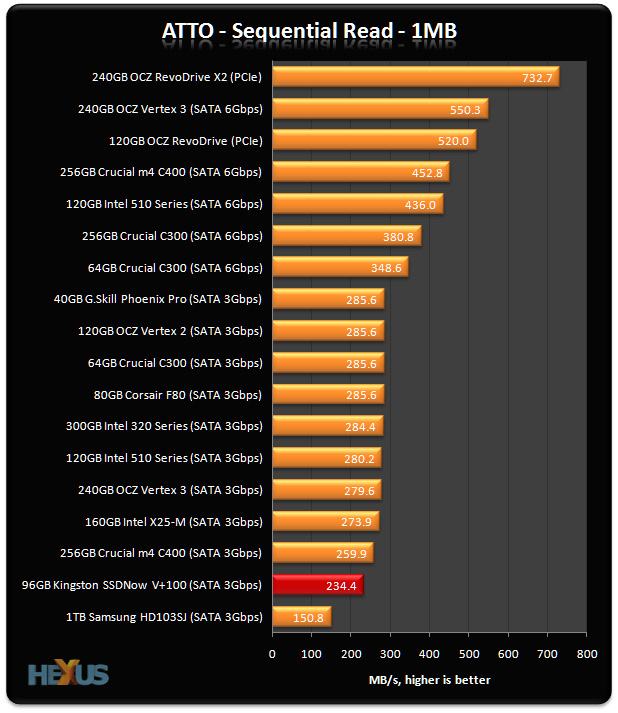
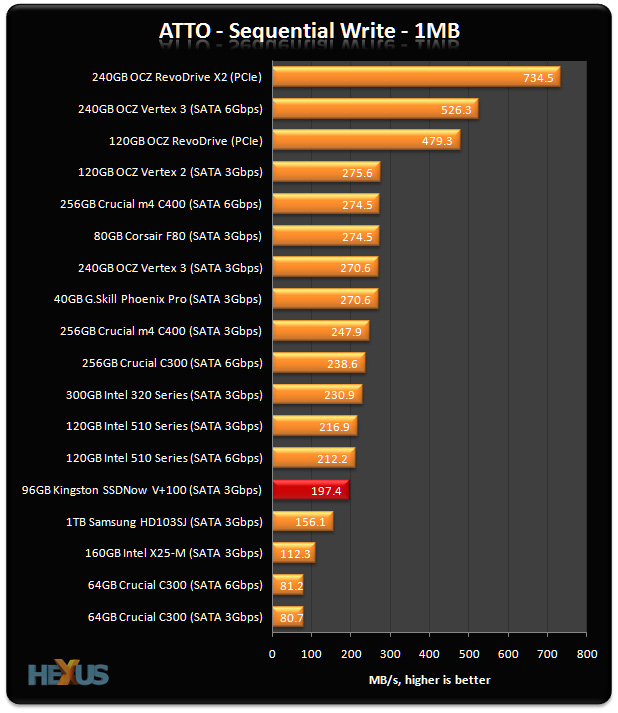
On a pound-per-gigabyte basis, Kingston's SSDNow V+100 drive is the best value SSD in our line up.
But taking the cheaper option does result in a drop in performance. In terms of raw sequential throughput, Kingston's drive is fractionally slower than almost all of the field - though, speeds of around 200MB/s are nothing to scoff at.
CrystalDiskMark
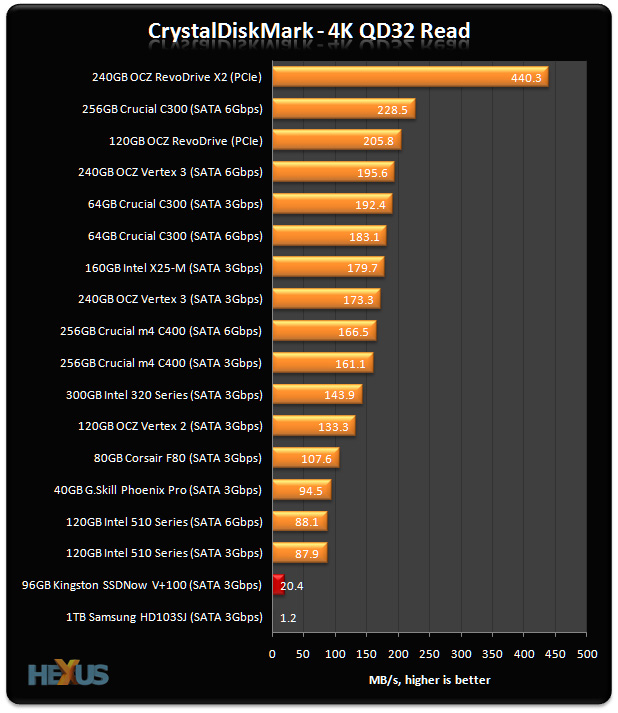
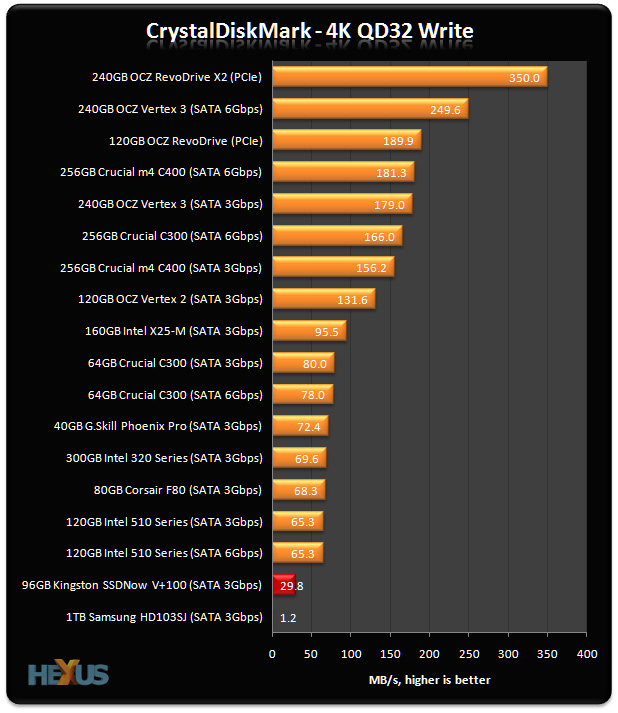
CrystalDiskMark confirms the SSDNow V+100's strong sequential read and write performance, but it also highlights a shortcoming; the Toshiba controller really struggles with 4KB random reads and writes at high queue depths.






